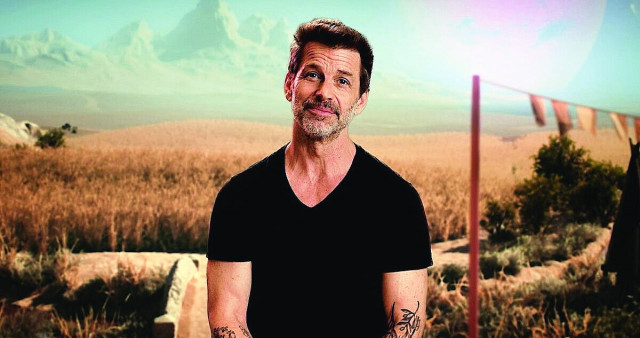Can AI steal director's chair?
Zack Snyder talks future of filmmaking

Zack Snyder has made a career out of bringing larger-than-life stories to the screen, from the iconic battle scenes of 300 to the dark grandeur of Watchmen and the superhero epics of Man of Steel and Batman v Superman: Dawn of Justice. But when it comes to the encroaching influence of artificial intelligence in filmmaking, Snyder is not too worried.
Speaking at WIRED's The Big Interview event, the director shared a perspective that might surprise those bracing for AI to revolutionise cinema: he doesn't think the rise of AI will make us all amateur filmmakers overnight. His assertion is a simple reminder: technology alone doesn't make artvision does.
A tool, not replacement
Snyder kicked off the discussion with a refreshing, almost understated take on AI's impact on the film industry. "Every single person has a pretty good movie camera on their phone," he said, pointing out that despite this accessibility, we aren't drowning in high-quality movies uploaded straight from our pockets. This observation is a subtle jab at the fantasy of democratised filmmaking that AI often promises. Sure, we have better tools than ever before, but that doesn't necessarily mean everyone's a Spielberg in the making.
In essence, Snyder was suggesting that having the tools doesn't guarantee greatness. "We don't have millions of awesome movies being uploaded," he added, grounding the conversation in the reality that filmmaking is still a craft that requires more than just access to technologyit demands vision, talent, and the kind of expertise that AI, in its current form, can't replicate.
While he's not about to throw up his hands and panic over AI stealing jobs, Snyder isn't naïve about the changes coming to filmmaking. He emphasised the importance of understanding AI, especially its role in image-making and storytelling. "Educating yourself and understanding what it can and can't do is important right now," Snyder remarked. "You have to understand what it is and what it's not capable of, and you have to be able to use it as a tool as opposed to standing on the sidelines with your hands on your hips."
What's key here is Snyder's acknowledgment of AI as an enabler, not a disruptor. He posed a question that rings through the minds of many filmmakers: What's the point of using AI if all you want to do is shoot footage of someone sitting in a chair in a living room? It's a fair question. The value of AI in filmmaking is undeniable, especially when considering the expensive logistical challenges of bringing fantastical worlds to life. AI, after all, doesn't care if a house is on fire or if it's situated on Mars. To AI, the distinction between Earth and the outer limits is irrelevant. For filmmakers, this can mean saving enormous amounts of money on special effects and impossible shots.
The human touch
Snyder also pointed out the significant potential of AI to enhance the creative process, particularly when it comes to merging real actors with virtual environments. He envisions a future where AI could understand a director's core aestheticcapturing not just the performance but also the nuanced lighting, the particles of dust floating through a room, and the meticulously designed set. In such a world, AI wouldn't just be an assistant, but a creative partner that syncs up with the director's vision.
Yet, even as Snyder speculates about AI's role in filmmaking, he makes it clear that there's one thing no machine can replace: the human element. "My favourite movies are the ones where I can feel the director's hand," he says. For Snyder, it's not just about the technical precision of a shot, but the emotion and perspective a filmmaker brings to it. Filmmaking, at its heart, is an intimate experience between the creator and the audience. It's a dynamic that AI, no matter how advanced, may never fully replicate.
The director's human touchthe ability to move the audience through unexpected twists and turnsremains the ultimate value in filmmaking. It's this connection, this emotional resonance, that has made films like 300 and Man of Steel cultural touchstones. As Snyder himself put it, the allure of cinema is how it can transport viewers into worlds they couldn't have imagined themselves, and that's something AI has yet to perfect.
New landscape of distribution
Another shift Snyder addressed was the evolving nature of film distribution. With streaming services like Netflix dominating the cinematic world, the way movies are consumed has drastically changed. Snyder's own work for streaming platforms has reached millions more people than ever would have in a theatre setting. As he sees it, the future of film may not lie in the traditional box office model. Movies classified as 'blockbusters' have and will undoubtedly draw a bigger audience if they're on a bigger streaming service than they would at the box office, he argued.
While traditional cinema has its charm, streaming opens doors for a much larger global audience. Snyder is fully aware that when you're making a movie for a service like Netflix, the reality is that millions of viewers will likely watch it on their phones, not in theatres. And that, he says, is part of the deal. If you're creating content for this medium, you have to embrace the format and the audience it attracts.
"It feels rude to say that I'm not an artist if my movie isn't in the theatre," he maintained. "If you're the streamer, you're paying for the movie, and if you say, 'This is our format and 250 million people are going to look at it on their phones, probably' at the very beginning of our conversation, then I have to know that's the reality. And if that's the case, then I should be fine with everything that happens afterward."


















COMMENTS
Comments are moderated and generally will be posted if they are on-topic and not abusive.
For more information, please see our Comments FAQ